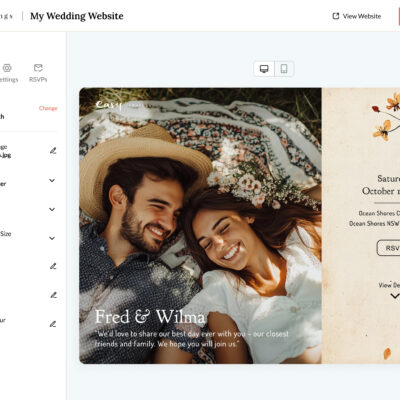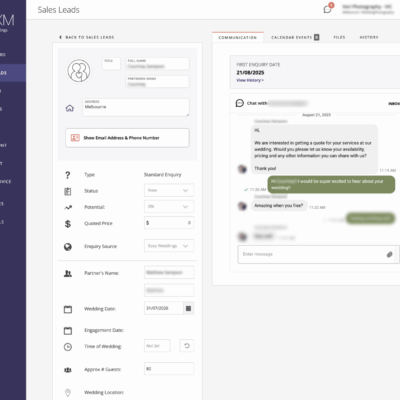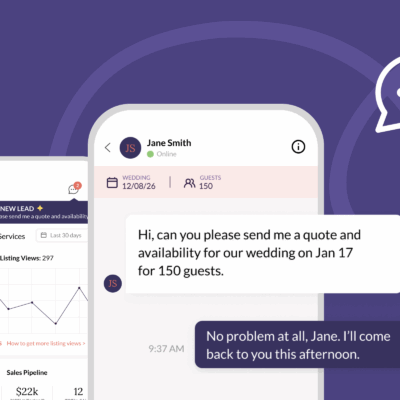 Easy Weddings launches Wedding Websites
Easy Weddings launches Wedding Websites
Protecting your wedding business from online scams
We know that wedding season is ramping up, and your calendars are probably looking very full. But as your books fill up, it’s important to stay vigilant with your online security. We look at ways to protect your wedding business from online scams.
There has recently been an uptick in online scams and cyber attacks. As we become more diligent internet users, scams become more sophisticated. If something looks suspicious, always err on the side of caution.
Here are some tips to protect your business from online scams.
To safeguard your business and personal information, here are some red flags to look out for:
- Unusual requests: Be wary f requests to add users on Instagram or solicitations for passwords and personal information, like confirmation of bank or credit card details. Always refrain from sharing sensitive information online.
- Suspicious links: Avoid suspicious links in text messages or emails, and avoid opening up attachments. Double-check the authenticity of URLs before engaging with them.
- Unauthorised email addresses: Check the sender’s email address. If the email claims to be from a well-known organisation but is from a Hotmail or Gmail carrier, this could be an indication that it’s a scam.
Spotting potential scams
If something looks either too good to be true or different from what you’re used to, it’s best to exercise caution.
- Too good to be true? If you see unrealistic discounts, unbelievable ROI promises, or any claims that have guaranteed results are classic red flags and signs of a scam.
- Pressure and urgency messages that demand immediate payment, quick decision, or the threat of account suspension are all common traits of scams.
- Unusual email addresses or domains can set off signals of suspicion. Emails may look professional, but the email addresses will have small errors (e.g., @amaz0n.com instead of @amazon.com).
- Poor grammar and spelling will be a strong indicator that it’s not a legitimate email. Many scam emails will have spelling mistakes and formatting issues, so think twice before actioning anything in an email that has spelling and grammar mistakes.
Trusting push notifications
Push notifications are a great indication that the message is legitimate. Here’s how to tell that a Push Notification is a real message:
- Come from apps or services you’ve actually installed and given permission to.
- Appear in a consistent format (e.g., banking app, email provider, project management tool).
- Won’t ask for sensitive details directly in the notification (they’ll direct you to log in securely).
Staying safe online
Online safety is paramount and something that your team should be confident with. From phone calls to text messages and rogue emails, scammers have found their way to infiltrate all our common messages of communication.
These steps will help you to keep your online presence safe.
- Train your team: Run a short cybersecurity awareness session so that everyone knows what phishing and scams look like.
- Verify before acting: Always confirm payments, bank details, or sensitive requests through a second channel (e.g. call the supplier)
- Use strong authentication and enable multi-factor authentication (MFA) for email, banking, and business tools.
- Keep your software updated as many of the operating systems and browsers will be updated for more security measures.
- Create clear politics with internal rules for handling invoices, payments, and data sharing so scammers can’t exploit confusion.
Always remember: If it looks too good to be true it probably is.
Strengthening your defenses
To enhance the security of your Easy Weddings account and overall online presence, we’ve brought in one time passwords (OTPs). The one-time password (OTP) systems provide a mechanism for logging on to a network or service using a unique password that can only be used once
Reporting suspicious activity
Your vigilance is integral in maintaining a secure community. If you encounter any unusual activity or suspect a scam with your Easy Weddings account, notify us promptly. Together, we can create a safer space for all our suppliers.For additional information and resources on recognising and avoiding scams, we recommend visiting scamwatch.gov.au.
 The critical role of response time in winning couples
The critical role of response time in winning couples  Easy Weddings 2025 Updates: Tools, trends and big announcements
Easy Weddings 2025 Updates: Tools, trends and big announcements  Introducing WedXM: The future of your Easy Weddings experience
Introducing WedXM: The future of your Easy Weddings experience